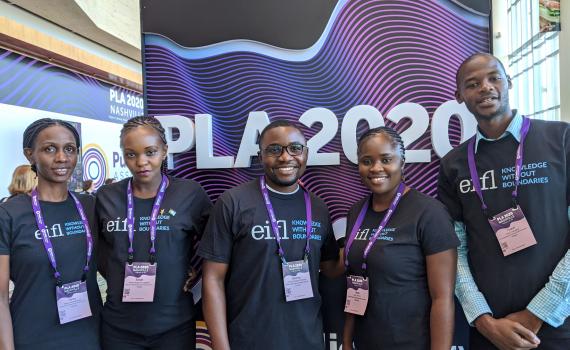
In February 2020 five young public librarians from Africa travelled to Nashville in the USA to take part in an international learning, knowledge-sharing and networking experience organized by EIFL and partners. The five were participants in the EIFL Initiative for Young African Library Innovators (IYALI). After their journey, we asked them about the experience and how they might apply what they had learnt in their libraries back home.
Over five days (25 – 29 February), the five IYALI 2020 participants became firm friends. They learnt together, shared knowledge about their libraries and communities, took part in a major US public library conference, saw conference exhibitions, visited public libraries, networked, shopped, got wet in the rain, and danced to the music of Nashville.
IYALI 2020 was a partnership between EIFL and the American Public Library Association (PLA), a division of the American Library Association. The learning experience included a workshop on library leadership led by EIFL Public Library Innovation Programme Capacity Building Manager, Susan Schnuer. Two of the IYALI 2020 participants gave presentations during the PLA Conference, a biennial gathering of thousands of public librarians, library support staff, publishers, authors and others.
‘The learning experience of a lifetime’
IYALI 2020 equipped the five participants to a vast array of new ideas, different ways of thinking about services, and unconventional approaches to librarianship. “It was the learning experience of a lifetime,” said Dominic Chitando, librarian at Kitwe City Council Public Library in Zambia.
Sarah Ogembo from Kenya National Library Service (KNLS), on her first visit to the US, made headlines in the PLA Conference daily newsletter. Her presentation on continued professional development of public librarians in Kenya, based on a programme initiated by EIFL in partnership with KNLS, delighted conference delegates, who inundated her with questions in breaks and other sessions. Yusuf Ganyana, also from KNLS, spoke with humour about how he overcame his personal fear of public speaking.
‘We must engage more with communities’
The overarching PLA Conference theme was equity, diversity, inclusion and social justice in public library services. Many conference delegates addressed inclusion of communities in library service development, and this was a topic that especially interested the IYALI 2020 group. “As librarians, we must engage more with our communities and come up with services and programmes that people will like,” said Letta Shivute from Mariental Community Library in Namibia.
Yusuf, who conducts ICT training at KNLS Kibera branch, says that in future he will be more active in finding out what kinds of ICT training community members need and want. “I will be able to tailor courses, for example, youth may want more social media training and e-research skills, older learners may want to focus on email and e-government services. And in future, I will offer classes for children, adults and seniors at different times. This will help overcome learners’ shyness about asking questions.”
Daisy Ashabahebwa, librarian at the National Library of Uganda, has already begun improving community outreach, using social media. “Kent Oliver, the Director of Nashville Public Library, spoke about how they use social media to market their activities and interact with people in their community. My colleague and I handle the library’s Facebook and Twitter account, and we have become more consistent in posting and tweeting. Already our followers are increasing,” she said.
‘A library is no longer a store of books’
The group visited Nashville Public Library, a large central city library, and its smaller branch, Looby Public Library. They observed how the culture of libraries in the USA is changing, and how libraries are becoming more inviting and user-friendly. “A library is no longer a store of books, journals and magazines but ‘a library of things’,” said Daisy.
Yusuf attended a session on ‘An Empathetic Approach to Customer Service Training’. “We were advised to always find ways to say ‘yes’ to our library users’ requests. This is key as they come to us for solutions, and if we say ‘no’, then who is going to help them?” he added.
He also noted that rules and regulations could be a barrier to library use: “We tend to be more rigid when it comes to library rules and regulations. But we could go fine free; we could allow snacks and sealed drinks in the library; comfortable chairs and chatting, as opposed to quiet rooms only for study.”
The way the two libraries in Nashville organize and use their spaces impressed the young library innovators from Africa. “There are spaces for different people to use separately and also together. Using the library is like a learning journey as you move from one space to the next,” said Yusuf.
“From Nashville Public Library I realized that some libraries in the US can relate really well with their communities because they have enough space to create unique activities, for example, they have space for games like chess, for puppet shows, for creativity. In Mariental, we have just three rooms. The library gets so crowded that we have had to schedule visits – adults can come in the morning, before lunch, and in the afternoon we serve schoolchildren,” said Letta.
‘See an opportunity in your problems’
Dominic turned practical advice about how to advocate into action immediately after he got home to Kitwe in Zambia - and got results. “I was lucky to meet two experienced library advocates during the PLA Networking Reception, Aileen Luppert and Ree West, from Spokane County Library District, Washington, US. They told me - ‘Dominic, sometimes for you to get things done - do it politically. See an opportunity in your problems and identify an influential politician to help.’ When I got home to Zambia we invited the Mayor of Kitwe to the library and shared our challenges with him. He went straight to the Town Clerk’s office and repeated everything we had said. Soon afterwards I received a call from the Town Clerk, who told me to write down a list of the things we want as a library. Now we have 10 new desktop computers!”
Letta also picked up on the theme of advocacy. “My biggest challenge is raising funds to enlarge our library. As librarians we are actively working and engaging with our communities, but we do not properly showcase the results of our work, and advocate for the changes we are bringing to our communities. That is something we must improve on,” said Letta.
‘I was transported into the past’
A highlight for the group was their visit to the Nashville Public Library’s Civil Rights Room, an educational space dedicated to the struggles of African American people for freedom and political rights: “I was transported into the past. The pictures on the walls, the quotes and phrases, evidence of non-violent protests and sit-ins got me thinking, why can’t libraries back at home capitalize on their history? Such spaces would encourage people coming into the library to do more research, and also give our information centres more personality and life,” said Sarah.
The Civil Rights Room inspired Daisy to begin researching the National Library of Uganda’s special collections for photographs from the early 1900s. “Our idea is to host an exhibition about history that is little known. Also, I hope to change the set-up of our exhibitions to make them more lively, using ideas from stalls that I saw in the PLA Conference exhibition hall.”
‘Across the world we share similar challenges’
In addition to meeting American librarians, the five IYALI participants networked with each other and members of the Leadership Academy of the African Library and Information Associations and Institutions. The Academy brought librarians from eight countries - Kenya, Nigeria, Seychelles, Sierra Leone, South Africa, Tanzania, Uganda and Zimbabwe - to the PLA Conference.
“I am now in contact with people I never ever imagined I would meet,” said Letta. “Talking to different librarians, from Africa and the USA, I realized that across the world we share similar challenges,” said Daisy.
The IYALI five arrived home buzzing with new ideas and plans for their libraries. However, COVID-19 meant they have had to delay action. While they are waiting for lockdown orders to be lifted, the new friendships and connections they made in Nashville have been both a help and a comfort to them: “We are continuing to share ideas. Together, we are keeping the energy alive,” said Letta.
Find out more
- The EIFL Initiative for Young African Library Innovators (IYALI) aims to expand the professional horizons of emerging African public library innovators by exposing them to experiences and ideas from other countries.
- Find out more about the IYALI 2020 participants.
SHARE / PRINT








